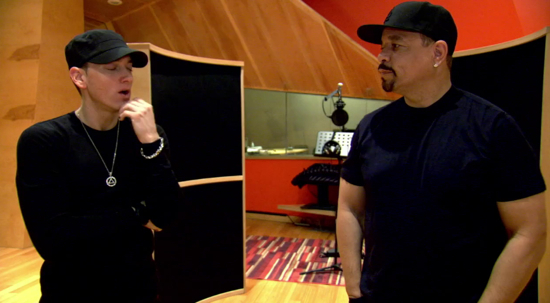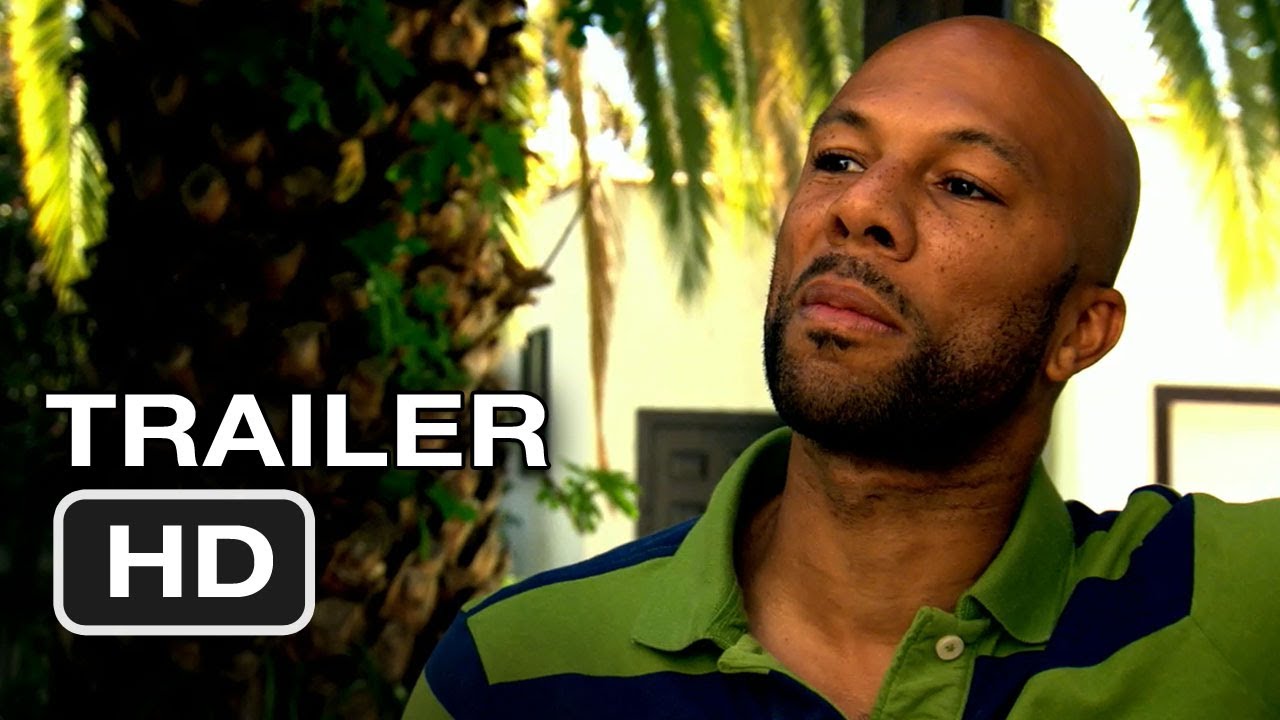So hip hop wasn’t a fad after all. Unless a fad can survive 35 years and permeate the mainstream off and on throughout that time. It hasn’t changed much either. When you strip away the corporatism, the polished veneer and blaring ostentation, it always comes back to the basics. Rap music is a product. Hip hop is a culture, and one that demands mastery and respect. Partisans will do anything to protect its integrity and keep the candle burning. Anything including pitching their director’s chair for the very first time.
Something From Nothing: The Art Of Rap is what happens when one of gangsta rap’s few architects flicks through his Rolodex and picks up the phone. It’s a fanatic’s dream. And for anyone unfamiliar with hip hop’s mythologised pioneers, it’s the ultimate disclosure of those originators’ love for its most exalted medium: rapping. It’s not just the opportunity to see and hear the greats share their most personal introspections, it’s their story told from home – either where it all began or where it later arrived. All the while, New York’s twinkling skyline and vast, sun-drenched shots of LA immerse you in hip hop’s own back yard.
Yet while the culture has boldly stood its ground in the last 30 years and counting, it’s been sprouting grey hairs. Pop has embraced all of its stylings, quirks and ticks uninvited and newcomers have hijacked it, contorted it and made it their own. It’s been reinvented and morphed, states and regions picking up the ball and running with it. Much like the upstarts who cut and pasted James Brown drum breaks in late ’70s and early ’80s NY, incomers have since seized rap’s instruments for their own intent. The most ardent guardians, not to mention hardened fans, aren’t happy about this at all.
It’s easy to view this sense of imposition, whether deserved or not, with scepticism. Who says what’s credible or not? Who determines who’s allowed in the circle? When ‘keeping it real’ becomes rhetoric, what authenticity is left and where do you find it? Ice-T won’t allow for blurred definitions or hazy misconceptions. He’s categorical and certainly won’t watch as hip hop’s virtues get papered over. Not on his watch.
You’ve gone from rapper to actor, actor to director. What was the biggest step for you?
Ice-T: Honestly, the biggest jump was getting out of the streets to rapping. Once I’d made it over to living legitimately, it was more like taking opportunities that were available to me. Everybody wants to do everything, they just don’t have the opportunity. I’d love to be a Formula 1 race car driver but no one’s thrown me the keys to a McLaren. That mental transition from infamy to the world of fame was a big step. If somebody says something about you, you can’t go see them. Everyone knows you, people have lawyers. It’s a totally different world, but it’s better. You lose a lot of the baggage – the paranoia – you get money and can spend it. But this jump to directing, it’s a lot of work and I have nothing but respect for the craft. I had no idea how much work’s involved.
Hip hop is in its fourth decade and its story has been told numerous times already. Is your film necessary in 2012?
IT: For the people who were around while it was being created, it’s dead serious. So I wanted to document it so people can learn who Grandmaster Caz is, who Afrika Bambaataa is while they’re still alive. You see at the end of the movie the RIP list and these people are dying. If you’ve got the chance to create a documentary with Ice Cube, Snoop Dogg and all the cats from the West Coast who created that footprint, you have to. When you can get all these legends together while they’re still alive, you have to. That’s why it wasn’t about getting the new school cats. I was like, "Let’s get the Gs!" Otherwise it’s another movie, you can do the next movie. We wanted to capture the foundation of hip hop culture.
One of the most striking things about the film is that there was only one Southern rapper, Bun B. Was this a deliberate omission?
IT: The South came later.
Acts like NWA and yourself came a decade after hip hop first emerged in New York. A decade after that and the South was already very popular. Acts like Geto Boys, Scarface, Outkast and 2 Live Crew were highly influential by the early ’90s.
IT: When I was rapping you had Geto Boys, Master P and Luke…
Kanye West features in the film but Ludacris, who’s from Atlanta, pre-dates Kanye. That’s just an example. Southern hip hop is noticeably absent.
IT: Not really. Kanye… See the movie’s not about that. It’s not about who came first. It was more like, "What if Ice-T looked in his phone book and called up 20 of his friends, we got them in this room and asked them questions?" Otherwise it would be a 15-hour movie.
It does have a chronology to it, though: it starts out in NY with the pioneers and then you travel across to the West Coast via Detroit.
IT: It was chronological from my journey. What I did was open up my phone book and I said, "I’m calling every motherfucker I got." I called Ludacris, I called Lil Wayne, I called a lot of people. I told people I was making a movie and they all said, "No problem, no problem, you got me." Trying to logistically get them was impossible. When Busta Rhymes saw the movie he looked at me and he said, "Ice, I am buried in regret that I missed the tag." I knew critics would say, "I didn’t see this person or that." But you know what? That’s why cameras exist and that’s why you can make your own movie.
The sound that dominates the mainstream is unarguably southern, with its synthesizers, quantized percussion and bouncing half-tempos. What do you make of that sound?
IT: The sound of the South is the sound of the South. It’s more like strip club music because when you’re in the South and they say they’re going to the club, it’s going to the strip club. It’s more bounce, party music. Back when I toured the South there wasn’t a rapper, it was the Bible Belt back then. Luke Skywalker broke it in Florida, Scarface broke it in Houston and Master P broke it in New Orleans, but you know, it’s a different sound.
A lot of fresh faces have found success and made money in recent years. Did you ever get a sense of bitterness among hip hop’s pioneers and veterans?
IT: There are going to be rap purists who have a problem with it. Everyone still has a sense of taste regardless. There’s always going to be people who like this and not that. I got certain rappers I like and I got certain rappers that are wack to me.
Like Soulja Boy? [Ice T took to YouTube in 2008 to denounce the diminutive young Mississippi MC]
IT: Is he even a rapper? A lot of people think they’re rappers but they’re not part of the clique. Inside the fraternity, inside the real infrastructure, they’re not even considered rappers. People are like, "You just made a record." Hip hop is a culture and if you don’t respect the culture, you’re not part of hip hop.
Anyone can rap. Lets say Fergie from Black Eyed Peas. They are hip hop, they were signed to Ruthless back in the day. But, with all due respect, is Fergie really hip hop? I don’t know… Anyone can rap. Like the girl [Kesha] who says, "Woke up in the morning feeling like P Diddy" . She’s rapping but is she hip hop? I don’t think so. So there are a lot of cats, you can even see in the South, who say they rap but they’re not hip hop, they’re just rapping. They’re not part of the culture. There are guidelines to go along with the culture.
What are those guidelines? Where’s the line drawn between the real deal and the pretenders?
IT: First you’ve got to be good. Secondly you’ve got to respect the culture and the artistry. I can’t be a rapper and diss Bambaataa. That’s impossible. That’s like being a DJ and dissing [Grandmaster] Flash, or a trumpet player dissing Miles Davis. To get into this and be part of the culture you have to respect it.
Do you think authentic hip hop can exist in the mainstream?
IT: No. It’s a counterculture. You don’t want the squares to respect it; it was against the squares. It’s like when your mum says, "Have you listened to your Ice-T record yet?" It’s over.
What if a particular artist and their music becomes popular beyond their control? Does that mean they’re no longer hip hop?
IT: We’re not mad at success. I just want people to look at the origins. If I think about what I miss today, I would say content. Right now MCs are more concerned with rocking a party or the club than really speaking their mind or saying anything.
That’s always been the case though, hasn’t it? If you look at the block parties of late ’70s NY, that was where it all began.
IT: There’s a similarity in terms of it being club music. But what made hip hop such a powerful force was not its club-rocking ability, it was Public Enemy, it was KRS-One. That’s what changed the world, that’s what’s brought me to London. If I came over here just for being a club artist, I’m at a dance convention. I’m not sitting in front of news broadcasters and people talking about serious issues. I don’t want the youth to forget that’s an important part of the music. If you take that away, it’s just bullshit.
I want to let the new MCs know that they should say what’s on their mind. I can listen to a lot of new kids and I can’t tell who the fuck they are. OK, you got a watch, you got a car, you got money. But who the fuck are you?
The other thing is, we were held accountable for our lyrics. Now everything’s pop, so if you want something to be real just put it in your bio. All the gangbanging and shit that I talked about? Come on. I’m coming out of LA gang culture. If I was lying, could I exist? I wouldn’t have made one album. In my whole career you’ve never heard anyone say there was something fake about my history, because it was accountable. Now you got people out here rapping and nobody knows who the fuck they are or where they came from. They just make it up as they go along.
Something From Nothing: The Art Of Rap is in selected UK cinemas now. A DVD release follows on October 8 via Kaleidoscope. Brendan Scott writes the hip hop blog UK All Day.




